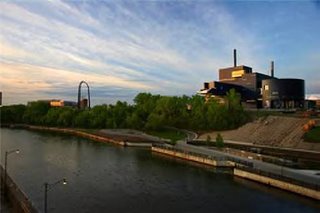 Let's see. What can I say about the new Guthrie Theater, built among old industrial sites and grain elevators on the banks of the Mississippi River? It's remarkable and in some ways breathtaking, yet disorienting. I initially felt out of my element there, mixed up, lacking an intuitive sense of how to get around; but by the end of the evening, as the pieces fell into place, I found it inspiring. The dark blue color that blends into the night sky. The ghostly images of actors from yesteryear gazing out of mirrored walls. The picturesque views of Minneapolis out of windows that were designed to provide postcard-like frames. The outdoor balcony that hangs over the river like a bridge to nowhere. It's modern and innovative and different. Yet the thrust stage is almost exactly like the one in the old Guthrie, which is a good thing.
Let's see. What can I say about the new Guthrie Theater, built among old industrial sites and grain elevators on the banks of the Mississippi River? It's remarkable and in some ways breathtaking, yet disorienting. I initially felt out of my element there, mixed up, lacking an intuitive sense of how to get around; but by the end of the evening, as the pieces fell into place, I found it inspiring. The dark blue color that blends into the night sky. The ghostly images of actors from yesteryear gazing out of mirrored walls. The picturesque views of Minneapolis out of windows that were designed to provide postcard-like frames. The outdoor balcony that hangs over the river like a bridge to nowhere. It's modern and innovative and different. Yet the thrust stage is almost exactly like the one in the old Guthrie, which is a good thing.There is an escalator that takes you straight from the first floor lobby to the fourth floor, where two of the main stages are, and if you suffer from the least bit of vertigo, you will notice it kick in here. The bathrooms (which do have dozens of stalls apiece) have faucets that turn on automatically, but they are hidden under a trough-like slab of metal that runs all the down a long wall, and there is no marker showing you where they are ... so you must run your hands along the underside of the metal until you find one. Who came up with that plan? Furthermore, there are bars placed in such a way that people standing in line for drinks are completely blocking the path of people walking from their seats to points beyond, such as the restrooms. That doesn't seem smart, either.
But the desserts ... aahhh. They serve them until midnight in the big restaurant on the balcony level, so after The Great Gatsby was over, Steve and I stuck around and had a slice of flourless chocolate cake that was to die for.
And what can I say about Gatsby? I was disappointed with it. I love this book and have read it several times, and this interpretation was just ... all wrong. Daisy was dreadful ... not at all alluring. In that poignant scene when she sees Gatsby's shirts, and she lifts them up to her face and breathes in deeply and realizes how much she has missed in those years without Gatsby, she is not supposed to begin shrieking like a drunken sorority girl and flailing the shirts over her head. Please. And even Nick Carroway's soliloquies, which are meant to fill in some of the narrative of the novel, didn't flow the way I imagined them to flow in the book. They fell victim to what I consider a weakness of drama: Over-emoting, near-yelling in an attempt to express what I feel sure F. Scott Fitzgerald meant to be conveyed as quiet passion. I don't think he meant Nick to be practically in tears when he uttered these final lines: Gatsby believed in the green light, the orgastic future that year by year recedes before us. It eluded us then, but that's no matter — tomorrow we will run faster, stretch out our arms farther. ... And one fine morning — So we beat on, boats against the current, borne back ceaselessly into the past. Those lines are haunting, not hysterical; mystical and timeless, not meant to be one man's catharsis on a stage.
And what is it with playwrights' (and screenwriters') tendancy to convert a character's inner thoughts into dialogue? In the book, Nick simply thinks this line: "They were careless people, Tom and Daisy — they smashed up things and creatures and then retreated back into their money or their vast carelessness, or whatever it was that kept them together…” In the play, he scathingly shouts it to them as an accusation as they walk away from him. That's wrong. That's not in his character.
Oh dear. I sound rather negative, I know. I did think the play had its good moments, and it improved in the second half. Nick was very good, and so was the actor who played Tom Buchanan. He was the perfect rich alpha-male. And Jordan Baker, the golf star, was pretty much as I imagined her in the book, too.
Maybe that's it. I read books with my imagination. My imagination. To see someone else's vision of it is to set myself up for a potential clash of imaginations. Sometimes I am pleasantly surprised. The Harry Potter movies have not disappointed me, for instance. But most of the time, I probably should just love the book and leave the rewrite.
(Photo by Jim Gallop from Guthrie photo gallery)






No comments:
Post a Comment